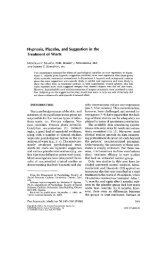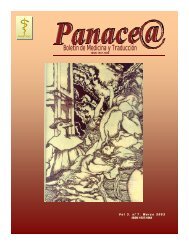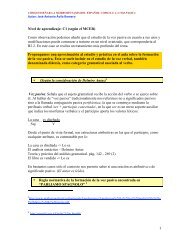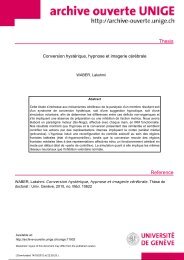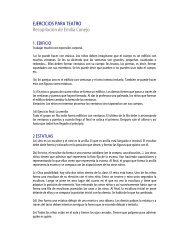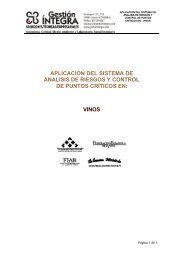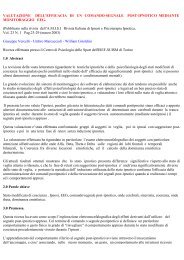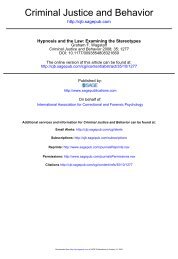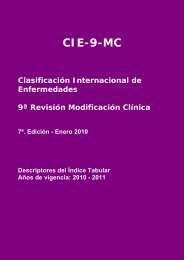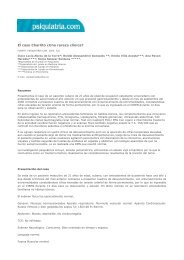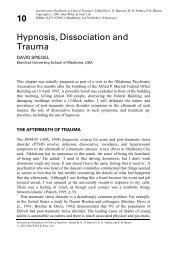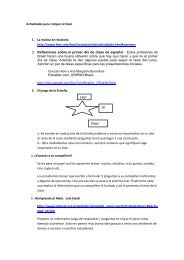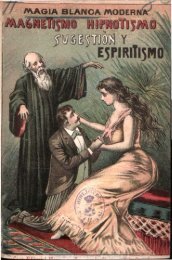Orne, M.T. The use and misuse of hypnosis in court. International ...
Orne, M.T. The use and misuse of hypnosis in court. International ...
Orne, M.T. The use and misuse of hypnosis in court. International ...
Create successful ePaper yourself
Turn your PDF publications into a flip-book with our unique Google optimized e-Paper software.
<strong>Orne</strong> 1979 IJCEHhttp://www.sas.upenn.edu/psych/history/orne/orneijceh19794311341.html4 de 23 19/03/2012 17:24seriously <strong>in</strong>jured. British Columbia law is such that if the driver had been careless or distracted, her<strong>in</strong>surance would be liable to the estate <strong>of</strong> her dead passenger <strong>and</strong> she herself would have no substantialclaim; however, if another car ca<strong>use</strong>d315 USE AND MISUSE OF HYPNOSIS IN COUR<strong>The</strong>r to run <strong>of</strong>f the road, her <strong>in</strong>surance company would not be liable <strong>and</strong> she herself would be able torecover very substantial damages from a special fund created for the purpose. At the time <strong>of</strong> the accident,however, the woman reported no recollection <strong>of</strong> such a car. Some time later her attorney referred her to apsychiatrist for help with emotional difficulties stemm<strong>in</strong>g from the accident, <strong>and</strong> also requested that hemight seek to facilitate her memory for the accident. <strong>The</strong>re is little doubt that the driver <strong>and</strong> her lawyerwere clearly aware <strong>of</strong> the substantial difference it would make whether or not another vehicle had been<strong>in</strong>volved <strong>in</strong> the accident; thus it is hardly surpris<strong>in</strong>g that under <strong>hypnosis</strong> she remembered a van com<strong>in</strong>gtoward her <strong>and</strong> forc<strong>in</strong>g her <strong>of</strong>f the road. If the driver had simply stated that one day she suddenlyremembered that a van had forced her <strong>of</strong>f the road, a jury would be likely to reject such "spontaneous"memories as self-serv<strong>in</strong>g <strong>and</strong> not trustworthy. Memories which are recalled via the <strong>use</strong> <strong>of</strong> <strong>hypnosis</strong>,however, are more apt to be taken at face value. This case was ultimately settled on the <strong>court</strong>ho<strong>use</strong> steps.Even so, it represents a <strong>use</strong> <strong>of</strong> <strong>hypnosis</strong> closely analogous to hypnotiz<strong>in</strong>g a defendant <strong>and</strong> open to all thecaveats <strong>in</strong>volved <strong>in</strong> such a <strong>use</strong>.THE NATURE OF HYPNOTIC RECALLWhen <strong>hypnosis</strong> is <strong>use</strong>d with a defendant or pla<strong>in</strong>tiff who has much to ga<strong>in</strong> by recall<strong>in</strong>g one set <strong>of</strong>memories rather than another, motivational factors are superimposed upon the basic mechanisms <strong>in</strong>volved<strong>in</strong> hypnotically aided recall. While these motivational factors complicate the picture, the basic facts aboutthe phenomenon <strong>of</strong> <strong>hypnosis</strong> <strong>and</strong> its effects on recall apply to all circumstances where <strong>hypnosis</strong> isemployed. <strong>The</strong> unreliability <strong>of</strong> hypnotic recall is due both to factors <strong>in</strong>herent <strong>in</strong> the nature <strong>of</strong> <strong>hypnosis</strong> <strong>and</strong>properties <strong>of</strong> the human memory system.Age RegressionWhile direct suggestion is sometimes <strong>use</strong>d to facilitate recall <strong>in</strong> <strong>hypnosis</strong>, the procedures most widelyemployed <strong>in</strong>volve some form <strong>of</strong> hypnotic age regression. This dramatic phenomenon appears to enable<strong>in</strong>dividuals to relive some past event which might have occurred many years ago. However, it is a methodthat can be equally effective <strong>in</strong> help<strong>in</strong>g an <strong>in</strong>dividual to relive recent events, particularly if they <strong>in</strong>volvesome trauma lead<strong>in</strong>g to motivated forgett<strong>in</strong>g manifested by the <strong>in</strong>ability to recall significant events. Notonly are extensive cl<strong>in</strong>ical observations available concern<strong>in</strong>g hypnotic age regression, but it has also beenstudied systematically <strong>in</strong> the laboratory, provid<strong>in</strong>g data which shed much light on the nature <strong>of</strong> theprocess, <strong>and</strong> on the critical issue <strong>of</strong> the historical accuracy <strong>of</strong> hypnotically elicited recall.316 MARTIN T. ORNEWhen a hypnotized <strong>in</strong>dividual is told that he is 6 years old <strong>and</strong> at his birthday party, for example, he willbeg<strong>in</strong> to act, talk, <strong>and</strong> to some degree th<strong>in</strong>k like a child. He may play as a child would; address the friendswho apparently were at his birthday party; <strong>and</strong> describe <strong>in</strong> detail the room where the party is occurr<strong>in</strong>g,the people who are <strong>in</strong> attendance, the presents he is receiv<strong>in</strong>g, <strong>and</strong> so on. <strong>The</strong> naturalness with whichthese descriptions are given <strong>and</strong> the conviction that is communicated by the <strong>in</strong>dividual are compell<strong>in</strong>geven to tra<strong>in</strong>ed observers. <strong>The</strong> feel<strong>in</strong>gs which are expressed appear appropriate to a child more than to anadult, <strong>and</strong> the entire phenomenon is such that it is generally described as beyond the skills <strong>of</strong> even apr<strong>of</strong>essional actor. In a therapeutic sett<strong>in</strong>g, the material that is recovered dur<strong>in</strong>g hypnotic age regression is<strong>of</strong>ten <strong>of</strong> great importance to a patient's treatment. As Breuer <strong>and</strong> Freud (1895/1955) discovered at the end<strong>of</strong> the 19th century, the reliv<strong>in</strong>g <strong>of</strong> traumatic events may result <strong>in</strong> the cure <strong>of</strong> troublesome pathological



